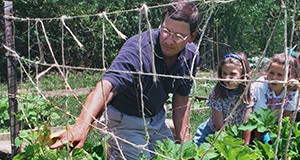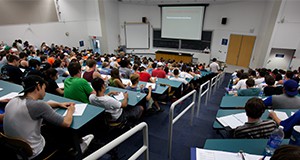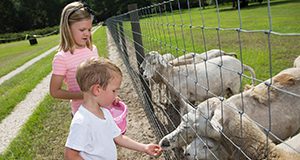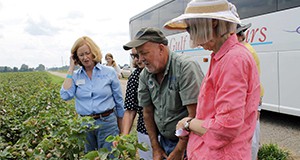This 3-page document is one in a series on communicating with policymakers and elected officials, and discusses strategies for meeting with elected officials. Written by Ricky Telg and Shelli Rampold and published by the UF/IFAS Department of Agricultural Education and Communication, January 2019.
http://edis.ifas.ufl.edu/wc318
Tag: Department of Agricultural Education and Communication
What is Understanding by Design (UbD)?
This 5-page document discusses Understanding by Design, an approach to designing curriculum that allows instructors to focus on desired learning outcomes and provide structure for student learning. Written by Tyler L. D’Angelo, Andrew C. Thoron, and J. C. Bunch and published by the UF/IFAS Department of Agricultural Education and Communication, January 2019.
http://edis.ifas.ufl.edu/wc322
Reframing Recognition in Organizations
Business leaders today are faced with challenges associated with employee engagement, recruitment, and the retention of top talent. One answer to these issues is employee recognition programs. This 6-page document discusses how to successfully implement an employee recognition program in your organization. Written by Matthew Sowcik, Hannah Carter, and Valerie McKee and published by the UF/IFAS Department of Agricultural Education and Communication, December 2018.
http://edis.ifas.ufl.edu/wc325
Leadership Skills Series #4: Working in Teams & Creating a Culture of Excellence
This 4-page document is the fourth publication in the Leadership Skills Series and provides Extension professionals with recommendations on how to utilize short leadership videos within the topics of working in teams and creating a culture of excellence. Written by Jera Niewoehner-Green, Matthew Sowcik, and Jennifer Wert and published by the UF/IFAS Department of Agricultural Education and Communication, December 2018.
http://edis.ifas.ufl.edu/wc321
Strategies for Engaging and Communicating with Elected Officials
This 5-page document is one in the series Communicating with Elected Officials. It details a strategy for those seeking to engage with elected officials. Written by Ricky W. Telg and Shelli D. Rampold and published by the UF/IFAS Department of Agricultural Education and Communication, December 2018.
http://edis.ifas.ufl.edu/wc324
Communicating to the Ages: Influence of Age on Florida Residents’ Informational Processing Behaviors
This 5-page document explores the results of a study in which Florida residents processed video messages about fertilizer best practices, with a focus on how their information-processing behaviors differed by age. Written by Amanda D. Ali, Laura A. Sanagorski Warner, Ashley N. McCleod, Shelli Rampold, and Alexa J. Lamm and published by the UF/IFAS Department of Agricultural Education and Communication, December 2018.
http://edis.ifas.ufl.edu/wc323
Engaging and Empowering Community Resource Organizations (CROs) Before, During, and After Disasters
This 3-page document is one in the Healthy Gulf, Healthy Communities series, which focuses on research studying the physiological, psychological, and sociological effects of the 2010 Deepwater Horizon oil spill in order to help communities recover and prepare for future potential disasters. Written by Angela B. Lindsey and Samantha Goldenberg and published by the UF/IFAS Department of Agricultural Education and Communication, December 2018.
http://edis.ifas.ufl.edu/wc319
Leadership Skills Series #2: General Leadership & Purpose/Values

This 3-page publication is the second in the Leadership Skills Series. It introduces four online videos that focus on everyday leadership, utilizing grit, finding one’s purpose, and learning how to feel good about work. Written by Jennifer Wert, Matthew Sowcik, and Jera Niewoehner-Green and published by the UF/IFAS Department of Agricultural Education and Communication, September 2018.
http://edis.ifas.ufl.edu/wc313
Key Program Outcomes for K-12 School Gardens Identified Through Expert Consensus
National trends indicate that school gardens are positioned to become fixtures in primary and secondary education. This 4-page document outlines key outcomes identified through expert consensus that can be used by Extension professionals to develop a logic model for the school garden program. Written by Susan Webb, John Diaz, and Catherine Campbell and published by the UF/IFAS Department of Agricultural Education and Communication, September 2018.
http://edis.ifas.ufl.edu/wc312
The Leadership Skills Series: Utilizing Videos to Address Leadership Skills
This 2-page publication is the introduction to the Leadership Skills Series, which looks at different leadership and professional development skills that can have a positive impact on the Extension workforce. Written by Matthew Sowcik, Jennifer Wert, and Jera Niewoehner-Green and published by the UF/IFAS Department of Agricultural Education and Communication, September 2018.
http://edis.ifas.ufl.edu/wc310
Using County Typology Informed by Population Size to Understand Key Audience Characteristics for Tailored Landscape Water Conservation Programs
A major priority for UF/IFAS is the promotion of science-based landscape management practices to conserve water resources. This 7-page publication outlines specific opportunities that exist for tailoring landscape water conservation programs to Floridians who live in more and less metropolitan areas. Written by Laura A. Sanagorski Warner and John M. Diaz and published by the UF/IFAS Department of Agricultural Education and Communication, September 2018.
http://edis.ifas.ufl.edu/wc314
Understanding the Barriers for School Garden Success: Expert Consensus to Guide Extension Programming
Research has found that youth involvement in school gardens leads to numerous benefits. However, teachers and support organizations must overcome barriers for garden sustainability. This 4-page document discusses barriers for school garden success and how Extension faculty can help education professionals overcome them. Written by Susan Webb, John Diaz, and Catherine Campbell and published by the UF/IFAS Department of Agricultural Education and Communication, August 2018.
http://edis.ifas.ufl.edu/wc315
Preparing to Work with Generation Z
Members of Generation Z, the incoming generation of college graduates and future members of the workforce, will require specific leadership and support to reach their potential and contribute to the needs of the agriculture industry. This 3-page publication describes Generation Z and offers best-known practices for preparing this generation to contribute to Florida’s agriculture and natural resource industries. Written by Celia Elizabeth Suarez and Valerie McKee and published by the UF/IFAS Department of Agricultural Education and Communication, August 2018.
http://edis.ifas.ufl.edu/wc311
Using Video Messages to Promote Residential Adoption of Fertilizer Best Practices
Residents may be inclined to over-fertilize their lawns due to pressure to maintain a neighborhood aesthetic. However, this activity can affect water quality. This 3-page document describes a study that was conducted in order to determine if video messages about fertilizer best management practices influenced perceptions of fertilizer use among residents. Written by Amanda D. Ali, Laura A. Sanagorski Warner, Peyton Beattie, Alexa J. Lamm, and Joy N. Rumble and published by the UF/IFAS Department of Agricultural Education and Communication, July 2018.
http://edis.ifas.ufl.edu/wc309
Helping Agritourism Visitors Learn During Their Visits
Agritourism is a growing industry in Florida, and combines two of the state’s major assets: tourism and agriculture. This 4-page document outlines ways that agritourism operators can incorporate meaningful educational opportunities into their operation. Written by Kathryn Stofer and Joy N. Rumble and published by the UF/IFAS Department of Agricultural Education and Communication, June 2018.
http://edis.ifas.ufl.edu/wc308
Teaching for Extrinsic Motivation

Motivation is the idea of being moved to do something, and levels of motivation vary among every individual. Extrinsic motivation is a specific type of motivation that is fueled by external rewards or an expected outcome. This 2-page document, written by Isabella Damiani, Andrew Thoron, and J. C. Bunch and published by the UF/IFAS Department of Agricultural Education and Communication, discusses how educators can foster extrinsic motivation among their students.
http://edis.ifas.ufl.edu/wc307
Selecting Educational Resources
Many instructors struggle to find appropriate educational resources. However, collaborative teaching and learning efforts have created a number of educational resources that can be stored, shared, adapted, and used within the agricultural education profession. This 7-page document will help educators in selecting educational resources. Written by Tyler D’Angelo, Deb Barry, J. C. Bunch, and Andrew Thoron and published by the UF/IFAS Department of Agricultural Education and Communication, June 2018.
http://edis.ifas.ufl.edu/wc303
Teaching and Learning: Motivating Learners
Motivation is a process that drives individuals forward. Educators must be aware of the continuum of motivation and appropriately provide opportunities for student engagement, learning, and growth. This 2-page document discusses how to motivate learners. Written by Isabella Damiani, Andrew Thoron, and J. C. Bunch and published by the UF/IFAS Department of Agricultural Education and Communication, May 2018.
http://edis.ifas.ufl.edu/wc305
Utilizing Demonstrations in Teaching, with An Example Demonstration of Plant Propagation via Cuttings
In a learning environment, it is important to provide instruction to each type of learner. This 4-page document discusses utilizing demonstrations for different types of learners and includes a sample demonstration of plant propagation. Written by Isabella Damiani, Andrew Thoron, and J. C. Bunch and published by the UF/IFAS Department of Agricultural Education and Communication, May 2018.
http://edis.ifas.ufl.edu/wc306
Selecting the Right Type of Educational Experience for Your Agritourism Operation
Agritourism has become a way for consumers to experience agriculture and for the industry to increase agricultural awareness. This 4-page document will help guide you toward selecting the right type of educational experience for your agritourism operation. Written by Joy N. Rumble, Kathryn Stofer, and Hoda Manafian Ghahfarokhi and published by the UF/IFAS Department of Agricultural Education and Communication, May 2018.
http://edis.ifas.ufl.edu/wc304












